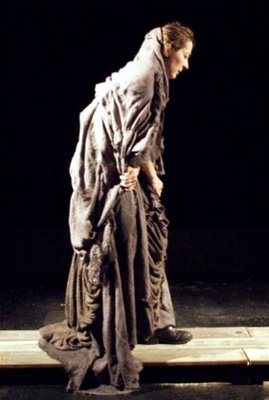
Reviewed by Aaron Riccio
The problem with Samuel Beckett’s short plays is the same one you’ll find with his longer plays – for all the bleakly hopeful lyricism, it’s more often confusing than delightful. If you really go to the theater for existential minimalism and enjoy theatrical devices over theater itself, Beckett’s tightly wrapped plays will delight you; otherwise, there’s not much to do but appreciate the scenery and the craft. Disclaiming aside, the theater company known as ghostcrab has decided to carry on (I can’t go on, I’ll go on) with a compilation of four short Beckett plays. Performed in a small underground theater that gets too stuffy for comfort, the evening is titled Beckett Below, and consists of “Play,” “Act Without Words II,” “Footfalls,” and “That Time,” each showcasing a different director and set of actors. The result is a visually striking enterprise that slathers on a great deal of respect for Beckett while attempting to convert its audience.
The pieces are all text-heavy and cryptic (with the exception of “Act Without Words II,” which is, as the title suggests, wordless), but the gist, conveyed through the atmosphere—a bleak and intentionally ill-lit basement—is one of either persistent suffering or suffering persistence. Each of the shows utilizes a different thematic approach to this subject, ranging from sublime repetition to the metaphoric display of time’s endless decay. In the first scene, “Play,” actors are minimized to heads atop urns that speak only when a flashlight shines on them, and then only for a moment. As if the bare-bones dialogue about an affair doesn’t get the essential drama across enough, the show repeats itself (in its entirety) for emphasis. It’s a nice theatrical touch, but not pleasant to watch.
The second scene, “Act Without Words II,” employs the same circular logic, this time watching the pantomimes of A and B as each, in turn, comes out of a sack, dresses, moves, undresses, and gets back into the sack at the prodding of a goad. Symbolism aside—just take the “a” out of “goad” and you’ve got humanity in a nutshell—you have to ask yourself if this is really what you want to see in the theater. The last two scenes aren’t as circular, but they’re heavy on text spoken by offstage characters (“Footfalls”) or on recorded dialogue (“That Time”), which makes the evening seem, at times, more like a reading than a staged work. There’s acting going on, be sure, and it’s fine, subtle work, but it’s passive and constrained, and not my idea of a good time.
Also, because Beckett’s estate does not allow a production to deviate from the explicit stage directions, if you’ve seen these scenes before, you need never see them again. These highly visual productions, unflinching and unmoving, are as static as the timelessness that they display. You can have intellectual and emotional theater, but Beckett Below, through no fault of ghostcrab, is just aesthetic theater: good for theater majors and historians, but dry as dust and liable to stay that way.
-----------------------------------------------------------
Under St. Marks (94 St. Marks Place)
Tickets (212-868-4444): $18.00
(THROUGH 11/18): Thursday-Saturday @ 8:00



No comments:
Post a Comment